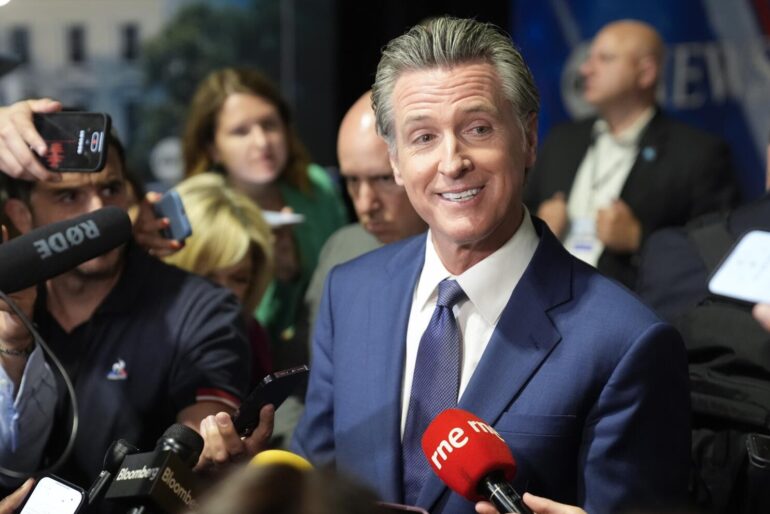California Governor Gavin Newsom has long been rumored as a future presidential contender, but in a series of recent interviews, he has finally acknowledged what many suspected: he is seriously considering a run for the White House in 2028. Speaking on CBS Sunday Morning and later on CNN, Newsom confirmed that after the 2026 midterm elections, he will give the idea “serious thought.” “Yeah. I’d be lying otherwise,” he told CBS, marking his most direct statement yet on the topic.
The governor’s comments come at a pivotal moment for the Democratic Party, still reeling from recent electoral setbacks and searching for its next generation of leaders. With his second and final term as governor ending in January 2027, Newsom is term-limited and free to pursue higher office. His national profile has grown steadily through outspoken criticism of President Donald Trump, frequent media appearances, and strategic travel to early primary states like South Carolina.
A Changing Political Calculus
Newsom’s openness about 2028 represents a departure from his earlier denials. For years, he insisted he had “sub-zero” interest in a presidential bid. But in his CNN interview on Monday, he explained that “everything has changed” under the current administration. He pointed to Trump’s deployment of the National Guard in cities like Los Angeles and plans to demolish parts of the White House as examples of a “radically different” political environment that has reshaped his perspective.
“I just think we’re on the other side of something radically different, not marginally different,” Newsom said. He framed his potential candidacy not as personal ambition but as a response to national crisis, warning that without strong leadership, “there might not be a 2028 election that’s free and fair.”
The Kamala Harris Factor
Complicating Newsom’s path is the re-emergence of another prominent Californian: former Vice President Kamala Harris. In a BBC interview published the same weekend, Harris refused to rule out another presidential run, saying she is “not done” and that public service is “in my bones.” When asked if she could be the first woman president her grandnieces see in their lifetime, Harris replied, “Possibly.”
The two politicians share deep roots in San Francisco—Harris as former district attorney, Newsom as former mayor—and have long navigated California’s political landscape together. Harris became a U.S. senator and then vice president, while Newsom rose to the governorship. Political analyst Brian Sobel described their relationship as one where they have “divided the spoils” in California but now face the prospect of competing head-to-head on a national stage.
“It’s important for Newsom to get out in front of this,” Sobel told KTVU, noting that Harris’s hints could allow her to build early momentum. “He doesn’t want Kamala Harris to gain any momentum without his name being in the mix.”
Proposition 50: A National Message in a Local Fight
For now, Newsom remains focused on California, where he is campaigning aggressively for Proposition 50, a ballot measure in the November 4 special election. The proposition would temporarily allow Democrats to redraw congressional district maps, potentially flipping five GOP-held House seats. Newsom has framed the measure as a direct counter to Republican efforts in states like Texas and a way to “stop Trump’s agenda.”
He has accused the Department of Justice of voter intimidation for sending election monitors to six California counties and dismissed criticism from former Republican Governor Arnold Schwarzenegger, calling the proposal “temporary, transparent, and democratic.”
Analysts see Prop 50 as more than a state issue—it’s a vehicle for Newsom to sharpen his national brand. A recent Emerson College poll showed his approval rating in California has risen 15 points in recent months, buoyed by Democrats receptive to his anti-Trump messaging. Another Emerson survey found a hypothetical 2028 matchup between Newsom and Vice President J.D. Vance statistically tied nationwide.
Overcoming Perceptions
A Newsom presidential campaign would face hurdles, particularly the stereotype of him as a “San Francisco liberal” out of touch with swing-state voters. The governor is already pushing back. In his CNN interview, he addressed the “silver spoon” misconception, emphasizing his working-class upbringing by a single mother who held multiple jobs. He plans to detail his personal story in a book set for release next year.
Newsom also reflected on his unlikely political journey with self-deprecating humor. “The idea that a guy who got 960 on his SAT, that still struggles to read scripts… the idea that you would even throw that out is, in and of itself, extraordinary,” he said. “Who the hell knows?”
The Road to 2028
As the Democratic field begins to take shape, Newsom’s decision will hinge on several factors: the 2026 midterms, the strength of other candidates, and his own sense of purpose. “The biggest challenge for anyone who runs for any office is, people see right through you,” he told CBS. “If you don’t have that ‘why,’ you’re doing it for the wrong reasons.”
For now, Newsom continues to position himself as the Democratic Party’s most combative voice against Trump, calling the president an “invasive species” and a “wrecking ball” to alliances, truth, and institutions. Whether that fight leads him to the White House remains uncertain—but for the first time, he’s no longer ruling it out.
